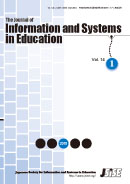Volume 14, Issue 1
Displaying 1-3 of 3 articles from this issue
- |<
- <
- 1
- >
- >|
Original Paper
-
Article type: Original Paper
2015Volume 14Issue 1 Pages 1-12
Published: 2015
Released on J-STAGE: April 23, 2015
Download PDF (1101K) -
Article type: Original Paper
2015Volume 14Issue 1 Pages 13-27
Published: 2015
Released on J-STAGE: April 23, 2015
Download PDF (1096K) -
Article type: Original Paper
2015Volume 14Issue 1 Pages 28-41
Published: 2015
Released on J-STAGE: April 05, 2016
Download PDF (2057K)
- |<
- <
- 1
- >
- >|
